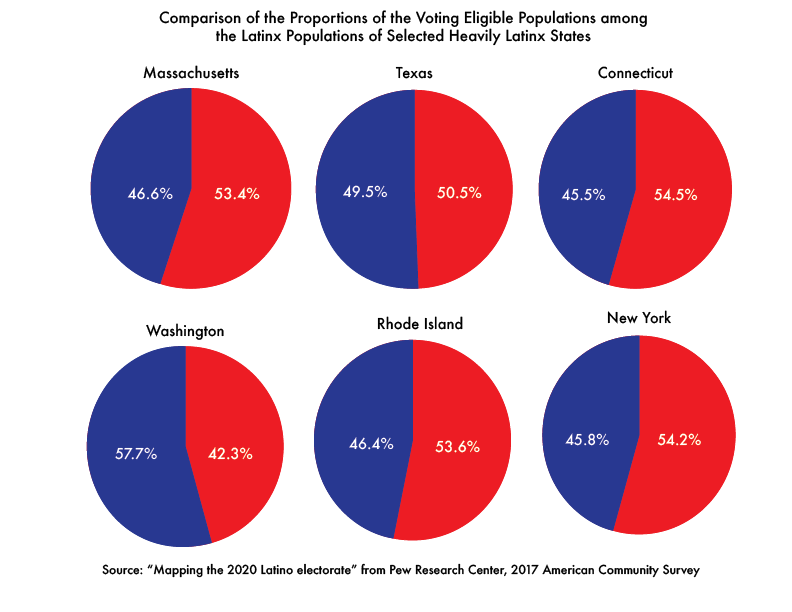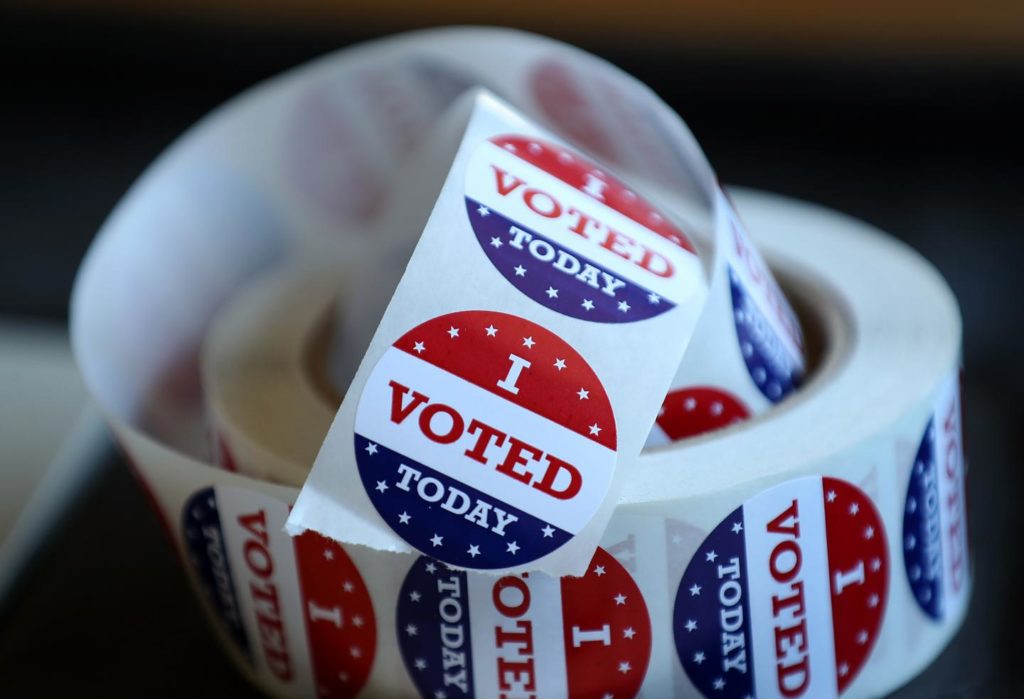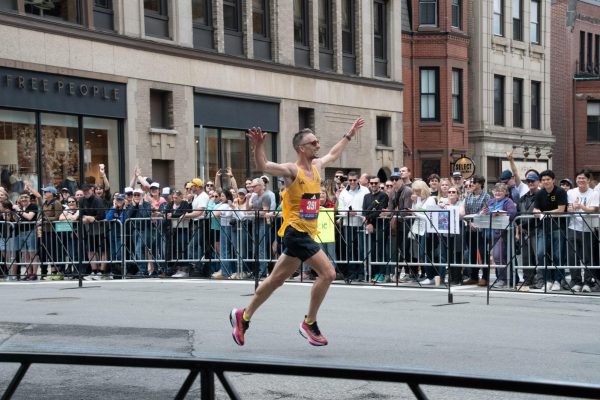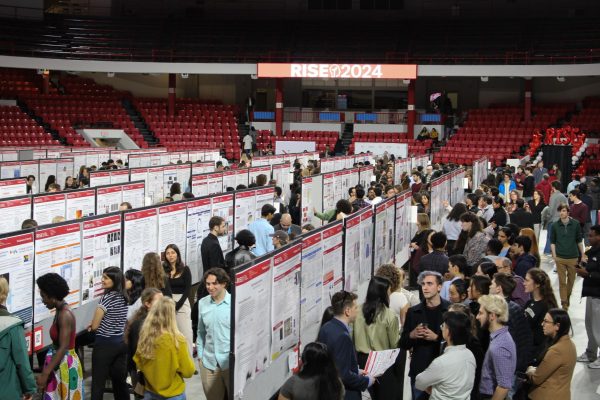The political power of Boston’s Latinx community
Hispanic and Latinx communities around the Greater Boston Area are increasing their stake in civic participation.
February 19, 2020
As the population of eligible Latinx voters in Massachusetts continues to grow and change, Latinx-led civic organizations continue to try to increase civic participation.
This year for the first time in history, Hispanic and Latinx Americans will make up the largest segment of citizens eligible to vote aside from non-Hispanic white people. However, unless Latinx voter turnout rises significantly, the number of Hispanic and Latinx Americans who vote will probably still be lower than the number of Black Americans — the next largest group — who vote. The proportion of Hispanic and Latinx Americans who have voted has been smaller than the portion who have not each year since 1996.
The Latinx population in Massachusetts faces significant barriers to gaining political power. According to the 2018 American Community Survey, there are 847,000 Latinx people in Massachusetts, but only 452,000 are eligible to vote. That number is up from 299,000 in 2010.
Phillip Granberry, a social demographer and research associate at the University of Massachusetts Boston who specializes in unauthorized immigration, thinks that the relatively low number of eligible Latinx voters has implications for their lack of political sway.
“Even though they are a growing population, the Latinos eligible to vote — over 18 and U.S. citizens — is a smaller percentage than other populations. [The number of] Latino voters in Massachusetts in the 2017 midterms went up really high. Their share of eligible voters is 8 percent while the total share [of the population] is 11 percent,” Granberry said. “Because of voting regulations, their share of the voting population is smaller, so it’s hard for them to get more political power.”
The gap between the Latinx population and the number of eligible Latinx voters is even higher in Massachusetts’ 7th Congressional District, which contains most of Roxbury, Dorchester, Mattapan, Chelsea, Everett, Somerville and Randolph as well as parts of Cambridge and Milton. In this district, Latinx people make up about 30 percent of the population, but only about 16 percent of the number of eligible voters.
According to Granberry, one reason for the gap between Massachusetts Latinx communities’ adult populations and eligible voter populations is the changing demographics of Boston’s Latinx population. This community has historically comprised mostly Puerto Ricans, who are American citizens, but in recent decades populations of Dominicans, Salvadorans, Colombians, Mexicans and Brazilians, who are not all American citizens, have increased in Greater Boston.
In the 2016 elections, only around 48 percent of Latinx voters came out to vote, while 49 percent of Asian voters, 60 percent of Black voters and 65 percent of white voters cast ballots. National civic organizations like Voto Latino, which has registered 49,000 people this primary season according to communications fellow Leslie Adames, and similar local civic organizations are working to increase Latinx turnout for the 2020 elections.

Heloisa Maria Galvão is the co-founder and executive director of the Brazilian Women’s Group, an organization comprised of Brazilian women that works to support Greater Boston’s Brazilian community. She considers encouraging new citizens to vote an important part of her group’s activities. The Brazilian Women’s Group helps Brazilian Bostonians vote by helping people to register and sending Portuguese speakers to the polls for people who need translating services.
“We want [them] to say, ‘If I can become a citizen, I become a citizen and register to vote and go to the polls to vote,’” said Galvão. “If we are not visible, we don’t have a voice.”
While Latinx voters voting in large numbers could yield a lot of power and influence in national elections, they could be more influential in local elections.
“Where we do see more Latino votes [and candidates] is in cities and towns, people voting for councils and running for councils — Lawrence, Springfield, Haverhill — getting them out to vote locally is important,” said Granberry.
Organizations like Brazilian Women’s Group and Amplify Latinx, which make up a collaborative movement that focuses on building Latinx economic and political power in Greater Boston, also promote other civic engagement activities in the Latinx community outside of voting.
Both Galvão and Rosario Ubiera-Minaya, Amplify Latinx’s executive director, emphasized the importance of the census in ensuring that Latinx people in Greater Boston have adequate resources and power. According to a Center for Latin American and Latino Studies working paper from American University’s Annual Latino Public Affairs Forum, the census is especially important for Latinx communities to secure federal funding and to ensure fair political representation.
“We feel that [the census] goes hand in hand with voter engagement and community engagement to make sure that our community understands the importance of being counted and what that means on the local level. Resources are going to be distributed based on census results,” said Ubiera-Minaya, specifically mentioning undocumented people, subletters and young children in Everett, Revere, Boston and Chelsea as populations to target with specific outreach.
Galvão also explained the importance of empowering Latinx people who are not eligible to reap the benefits of civic participation.
“If you can’t vote, still get involved. We tell people It’s important to get involved and try to influence your neighbors,” said Galvão. “[Many Brazilian immigrants] come looking down and thanking the government for everything and think they don’t have rights. Everyone has civil rights, and we need to exercise our rights… Our role is to show people even if they don’t have papers, you still pay taxes and earn money.”
Another one of Amplify Latinx’s civic engagement programs is its Mission 20 by 2020 campaign, an initiative to elect 20 new Latinx leaders to Massachusetts public boards and commissions.
“In terms of women and then people of color, the Latinx individuals are the ones that are less represented [on public boards]… Having the power to make decisions at high levels, we really think that as a community that is what is going to move us forward,” said Ubiera-Minaya. “A lot of decisions are made at those tables that affect our community in different ways and most of the time in negative ways. If we are not there to address the issues and bring in the perspective of the Latinx community, those decisions are not going to improve our well-being as a community and help us grow.”


















